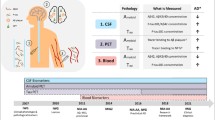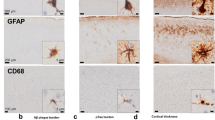Abstract
Patients diagnosed with mild cognitive impairment (MCI) have a higher risk of developing Alzheimer's disease (AD). However, not all such patients develop this kind of dementia. The purpose of this prospective study was to assess whether regional cerebral blood flow (rCBF) patterns measured with technetium-99m ethyl cysteinate dimer single-photon emission tomography (99mTc-ECD SPET) in patients suffering from MCI are useful in predicting progression to AD. The study group comprised 42 patients who fulfilled MCI criteria according to the International Psychogeriatric Association and the Alzheimer's Disease Cooperative Study. rCBF was calculated in 16 regions of interest (ROIs). All patients were clinically assessed for 1–3 years. Twenty-one developed AD (group I) while the initial diagnosis of MCI was retained in the other 21 (group II). ROC curves were designed, and sensitivity, specificity, positive and negative predictive values, and positive and negative likelihood ratios were determined for each ROI. Compared with group II (MCI), group I (AD) showed a significant reduction of relative blood flow (RBF), ranging from 7% to 10%, in the following areas: right and left prefrontal, right and left frontal, right and left parietal, right and left temporal, right and left frontoparietotemporal and left posterior lateral temporal. Left prefrontal, left frontal and left parietal areas showed sensitivities and specificities higher than 75% and areas below the ROC curve close to 80%. This study shows that RBF patterns in the right and left prefrontal, right and left frontal and left parietal areas are sensitive early markers of progression towards AD. Reduction of rCBF in the medial temporal and anterior lateral temporal cortex has no value as a predictor since it also occurs in patients with MCI who remain stable.

Similar content being viewed by others
References
American Psychiatric Association. Diagnosis and statistical manual of mental disorders, 4th edn. Washington D.C., 1994.
World Health Organization. The ICD-10 Classification of mental and behavioural disorders. Geneva: World Health Organization, 1992.
Petersen RC, Doody R, Kurz A, Mohs RC, Morris JC, Rabins PV, Ritchie K, Rossor M, Thal L, Winblad B. Current concepts in mild cognitive impairment. Arch Neurol 2001; 58:1985–1992.
Robles A, Del Ser T, Alom J, Peña-Casanova J; Grupo Asesor del Grupo de Neurología de la Conducta y Demencias de la Sociedad Española de Neurología. Propuesta de criterios para el diagnóstico clínico del deterioro cognitivo ligero, la demencia y la enfermedad de Alzheimer. Neurologia 2002; 17:17–32.
Cullum C, Huppert FA, McGee M, Dening T, Ahmed A, Paykel ES, Brayne C. Decline across different domains of cognitive functioning in normal ageing: results of a longitudinal population-based study using CAMCOG. Int Geriatr Psychiatry 2000; 15:853–862.
Petersen RC, Smith GE, Waring SC, Ivnik RJ, Tangalos EK, Kokmen E. Mild cognitive impairment: clinical characterization and outcome. Arch Neurol 1999; 6:303–308.
Schofield PW, Marder K, Doonieief G, Jacobs DM, Sano M, Stern Y. Association of subjective memory complaints with subsequent cognitive decline in community-dwelling elderly individuals with baseline cognitive impairment. Am J Psychiatry 1997; 154:609–615.
Johansson B, Zarit SH. Early cognitive markers of the incidence of dementia and mortality: a longitudinal study of the oldest old. Int J Geriatr Psychiatry 1997; 12:53–59.
Ritchie K, Ledesert B, Touchon J. Subclinical cognitive impairment: epidemiology and clinical characteristics. Compr Psychiatry 2000; 41:61–65.
Hogan DB, Ebly EM. Predicting who will develop dementia in a cohort of Canadians seniors. Can J Neurol Sci 2000; 27:18–24.
Rubin EH, Morris JC, Grant EA, Vendegna T. Very mild senile dementia of the Alzheimer type. I. Clinical assessment. Arch Neurol 1989; 46:379–382.
Tierney MC, Szalai JP, Snow WG, et al. Prediction of probable Alzheimer's disease in memory-impaired patients: a prospective longitudinal study. Neurology 1996; 46:661–665.
Morris JC, Storandt M, Phillip JP, McKeel D, Price JL, Rubin EH, Berg L. Mild cognitive impairment represents early-stage Alzheimer disease. Arch Neurol 2001; 58:397–405.
Bozoki A, Giordani B, Heidebrink JL, Berent S, Foster N. Mild cognitive impairment predict dementia in nondemented elderly patients with memory loss. Arch Neurol 2001; 58:411–416.
Christiansen H, Henderson AS, Korten AE, Jorm AF, Jacomb PA, Mackinnon AJ. ICD-10 mild cognitive disorder: its outcome three years later. Int Geriatr Psychiatry 1997; 12:581–586.
Helkala EL, Koivisto K, Hanninem T, Vanhanen M, Kuusisto J, Mykkanen T, Laakso M, Riekkinen P. Stability of age-associated memory impairment during a longitudinal population-based study. J Am Geriatric Soc 1997; 45:120–122.
Daly E, Zaithchik D, Copeland M, Schmahmann J, Gunther J, Albert M. Predicting conversion to Alzheimer disease using standardized clinical information. Arch Neurol 2000; 57:675–680.
Palmer K, Wang H, Backman L, Winbland B, Fratiglioni L. Differential evolution of cognitive impairment in nondemented older persons: results from the Kungsholmen Project. Am J Psychiatry 2002; 59:436–442.
Rubin DH, Storandt M, Miller JP, et al. A prospective study of cognitive function and onset of dementia in cognitively healthy elders. Arch Neurol 1998; 55:395–401.
Masur DM, Sliwinski M, Lipton RB, Blau AD, Crystal HA. Neuropsychological prediction of dementia and the absence of dementia in healthy elderly persons. Neurology 1994; 44:1427–1432.
Howieson DB, Dame A, Camicioli R, Sexton G, Payami H, Kaye JA. Cognitive markers preceding Alzheimer's dementia in the healthy oldest old. J Am Geriatr Soc 1997; 45:584–589.
Wolf H, Grunwald M, Ecke GM, Zedlick D, Bettin S, Dannenberg C, Dietrich J, Eschrich K, Arendt T, Gertz HJ. The prognosis of mild cognitive impairment in the elderly. J Neural Transm Suppl 1998; 54:31–50.
Camicioli R, Howieson D, Oken B, Sexton G, Kaye J. Motor slowing precedes cognitive impairment in the oldest old. Neurology 1998; 50:1496–1498.
De Leon MJ, George AE, Golomb J, et al. Frequency of hippocampal formation atrophy in normal aging and Alzheimer's disease. Neurobiol Aging 1997; 18:1–11.
Jack CR Jr, Petersen RC, Xu YC, O'Brien PC, Smith GE, Ivnik RJ, Boeve BF, Waring SC, Tangalos EG, Kokmen E. Prediction of AD with MRI-based hippocampal volume in mild cognitive impairment. Neurology 1999; 52:1397–1403.
Jack CR Jr, Petersen RC, Xu YC, O'Brien PC, Smith GE, Ivnik RJ, Boeve BF, Waring SC, Tangalos EG, Kokmen E. Rates of hippocampal atrophy correlate with change in clinical status in aging and AD. Neurology 2000; 55:484–489.
Yamaguchi S, Menguro K, Shimada M, Ishizaki J, Yamadori A, Sekita Y. Five year retrospective changes in hippocampal atrophy and cognitive screening test performances in very mild Alzheimer's disease: The Tajiri Project. Neuroradiology 2002; 44:43–48.
Du AT, Schuff N, Amend D, Laakso MP, Hsu YY, Jagust WJ, Yaffe K, Kramer JH, Reed B, Norman D, Chui HC, Weiner MW. Magnetic resonance imaging of the entorhinal cortex and hippocampus in mild cognitive impairment and Alzheimer's disease. J Neurol Neurosurg Psychiatry 2001; 71:441–447.
Kantarci K, Jack CR Jr, Xu YC, Campeau NG, O'Brien PC, Smith GE, Ivnik RJ, Boeve BF, Koknem E, Tangalos EG, Petersen RC. Regional metabolic patterns in mild cognitive impairment and Alzheimer's disease: a1H MRS study. Neurology 2000; 55:210–217.
Parnetti L, Lowenthal D, Presciutti O, Pelliccioli G, Palumbo R, Gobbi G, Chiarini P, Palumbo B, Tarducci R, Senin U. H-MRS, MRI-based hippocampal volumetry, and99mTc-HMPAO-SPECT in normal aging, age-associated memory impairment, and probable Alzheimer's disease. J Am Geriatr Soc 1996; 44:209–211.
De Santi S, de Leon MJ, Rusinek H, Convit A, Tarshish CY, Roche A, Tsui WH, Kandil E, Boppana M, Daisley K, Wang GJ, Schlyer D, Fowler J. Hippocampal formation glucose metabolism and volume losses in MCI and AD. Neurobiol Aging 2001; 22:529–539.
De Leon MJ, Convit A, Wolf OT, Tarshish CY, De Santi S, Rusinek H, Tsui W, Kandil E, Scherer AJ, Roche A, Imossi A, Thorn E, Bobinski M, Caraos C, Lesbre P, Schyler D, Pirier J, Reisberg B, Fowler J. Prediction of cognitive decline in normal elderly subjects with 2-(18F)fluoro-2-deoxy-d-glucose/positron-emission tomography (FDG/PET). Proc Natl Acad Sci U S A 2001; 98:10966–10971.
Arnaiz E, Jelic V, Almkvist O, Wahlund LO, Winblad B, Valind S, Norberg A. Impaired cerebral glucose metabolism and cognitive functioning predict deterioration in mild cognitive impairment. Neuroreport 2001; 12:851–855.
Kogure D, Matsuda H, Ohnishi T, Asada T, Uno M, Kunihiro T, Nakano S, Takasaki M. Longitudinal evaluation of early Alzheimer's disease using brain perfusion SPECT. J Nucl Med 2000; 41:1155–1162.
Okamura N, Shinkawa M, Arai H, Matsui T, Nakajo K, Maruyama M, Hu XS, Sasaki H. Prediction of progression in patients with mild cognitive impairment using IMP-SPECT. Nippon Ronen Igakkai Zasshi 2000; 37:974–978.
Ishiwatta A, Kitamura S, Nagazumi A, Terashi A. Cerebral blood flow of patients with age-associated memory impairment and the early stage of Alzheimer's disease. A study by SPECT using the ARG method. Nippon Ika Daigaku Zasshi 1998; 65:140–147.
Johnson KA, Jones K, Holman BL, Becker JA, PA Spiers PA, Satlin A, Albert MS. Preclinical prediction of Alzheimer's disease using SPECT. Neurology 1998; 50:1563–1572.
Marquis S, Moore M, Howieson DB, Sexton G, Payami H, Kaye A, Camicioli R. Independent predictors of cognitive decline in healthy elderly persons. Arch Neurol 2002; 59:601–606.
Black SE. Can SPECT predict the future for mild cognitive impairment? Can J Neurol Sci 1999; 26:4–6.
Bottino CM, Almeida OP. Can neuroimaging techniques identify individuals at risk of developing Alzheimer's disease? Int Psychogeriatr 1997; 9:389–403.
Lobo A, Ezquerra J, Gómez FB et al. El Mini-Mental cognoscitivo. Un test sencillo y práctico para detectar alteraciones intelectuales en pacientes médicos. Acta Luso-Esp Psiquiatr Psicol Med 1979; 3:189–202.
Report of the Quality Standards Subcommittee of the American Academy of Neurology. Practice parameters for diagnosis and evaluation of dementia (Summary Statement). Neurology 1994; 44:2203–2206.
Read SL, Miller BL, Mena I, Kim R, Itabashi H, Darby A. SPECT in dementia: clinical and pathological correlation. J Am Geriatr Soc 1995; 43:1243–1247.
Johnson KA, Holman BL, Mueller SP, Rosen TJ, English R, Nagel JS. Single photon emission computed tomography in Alzheimer's disease: abnormal iofetamine I 123 uptake reflects dementia severity. Arch Neurol 1988; 45:392–396.
Pearlson GD, Harris GJ, Powers RE, et al. Quantitative changes in mesial temporal volume, regional cerebral blood flow, and cognition in Alzheimer's disease. Arch Gen Psychiatry 1992; 49:402–408.
Huang C, Wahlund LO, Svensson L, Winblad B, Julin P. Cingulate cortex hypoperfusion predicts Alzheimer's disease in mild cognitive impairment. BMC Neurol 2002; 2:9.
Tanaka M, Fukuyama H, Yamauchi H, Narita M, Nabatame H, Yokode M, Fujimoto N, Kita T, Murakami M. Regional cerebral blood flow abnormalities in nondemented patients with memory impairment. J Neuroimaging 2002; 12:112–118.
Acknowledgements
We would like to express our gratitude to the nursing and radiography staff within the Nuclear Medicine Department for their contribution and to Eva Martín, graphic designer, for her technical support.
This research project was partially financed by a Postgraduate Scholarship, Complutense University, Madrid, Spain and by the Comunidad de Madrid (08.5/0009/98).
Author information
Authors and Affiliations
Corresponding author
Rights and permissions
About this article
Cite this article
Encinas, M., de Juan, R., Marcos, A. et al. Regional cerebral blood flow assessed with 99mTc-ECD SPET as a marker of progression of mild cognitive impairment to Alzheimer's disease. Eur J Nucl Med Mol Imaging 30, 1473–1480 (2003). https://doi.org/10.1007/s00259-003-1277-z
Received:
Accepted:
Published:
Issue Date:
DOI: https://doi.org/10.1007/s00259-003-1277-z




